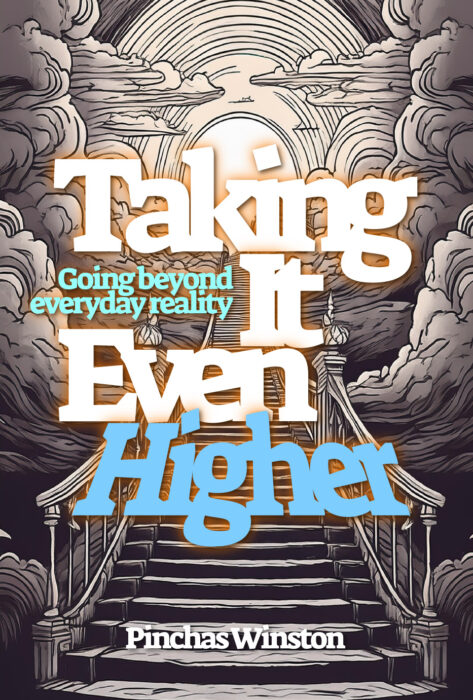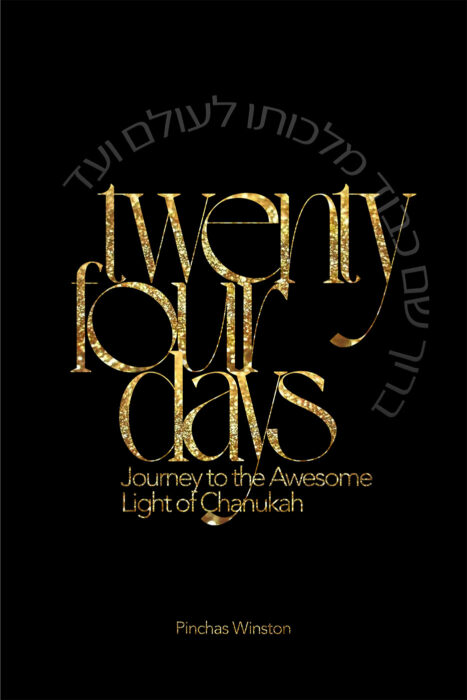Parashas BeHa’alosecha, Issue #1050 – By Rabbi Pinchas Winston
Friday Night
THE MENORAH REPRESENTED many things, one of which was emunah, faith in God. The Shulchan, on which the Lechem HaPanim, the shewbread sat all week, represented bitachon, trust in God. Let me show you how.
I have mentioned in the past that emunah and bitachon are two steps of a single process. Emunah is faith that you build up based upon what God has done for you in the past. Bitachon is what you have when you use that emunah to believe that God will come through for you in the future.
For example, you only have emunah in your dry cleaners based upon past experience of doing a good job and not ruining your clothing. You rely on that to have bitachon that they will continue to do a good job for you when bringing them your expensive new suit to clean.
What does that have to do with the Menorah and the Shulchan?
Before explaining this, we need to add one more detail. The Gemora says that if someone wants to increase their parnassah—livelihood, they should angle to the north during Shemonah Esrai. The Shulchan, which was to the north, represented parnassah because it held the bread for the kohanim. If a person wants to increase their wisdom, the Gemora explains, they should angle themself to the south where the Menorah stood and represented wisdom (Bava Basra 25b). Parnassah is always a future concern, and that takes bitachon. Wisdom is based upon past knowledge, and that is the basis of emunah.
And something else as well. The Menorah in the Mishkan had seven branches, three on each side and one in the middle. But the three flames on the eastern side and the three on the western side were made to face the middle branch, which pointed upwards. This taught that everything points in one direction or another, but in the end, they must all point to God.
Simply put, no matter how unattached an event may seem from God, it isn’t unattached at all. Everything but everything is a function of Hashgochah Pratis and never random, especially wisdom. You may have learned this from one teacher and that from another, but ultimately it was only because God arranged it for you, so that you could become wiser. Wisdom comes from God.
Not only does wisdom come from God, it is essential for seeing God. It takes wisdom to look at an event in life and see the hand of God that made it occur. The average person just sees events that happen and people that make them happen. But it is the wise person who sees both as a form of divine communication, making emunah a function of wisdom, not blind abandonment to an idea.
Shabbos Day
ONE OF THE most famous monuments in ancient Rome is the Arch of Titus, constructed by Roman emperor Domitian around 81 CE. after the death of his brother and predecessor, emperor Titus. The arch celebrates Titus’s military victories during the First Jewish-Roman War, when the Romans infamously burned the Temple in Jerusalem in 70 CE. One of the arch’s panels depicts Roman soldiers carrying captured treasures from Jerusalem’s Temple, including a large menorah, through the streets of Rome.
A conquerer’s praise is the conquered’s disgrace. It wasn’t good enough just showing booty. The Roman’s had to put the Menorah in the picture for generations to come. They may have thought little of it other than just a symbol of their military victory. But Hashgochah Pratis put it in there to tell generations what the Roman’s really walked off with that war, the emunah of the Jewish people.
It had been coming ever since Pompey conquered Jerusalem in 63 BCE, officially starting the fourth and final predicted exile of the Jewish people, Golus Edom. After rebuffing Eisav back in Ya’akov’s time, Eisav had finally grown into a mighty nation capable of overcoming the Jewish people. But on one condition, Yitzchak told Eisav:
And you shall live by your sword, and you shall serve your brother, and it will be, when you grieve, that you will break his yoke off your neck. (Bereishis 27:40)
When you grieve is an expression of pain, as in: “I will lament in my speech” (Tehillim 55:3), i.e., when the Jewish people will transgress the Torah, and you will have cause to grieve about the blessings that he took, “you will break his yoke,” etc. (Rashi)
The thing is, the Jewish people have always broken the Torah at some point in time and on some level. And when Pompey came, and even by the time Titus came, there were still plenty of Jews who were keeping Torah to the best of their ability. How many sins have to be committed, and how many Jews have to be committing them, before Eisav gets free rein to destroy them?
Or is it about something else, as the Torah indicates here:
All these curses will befall you, pursuing you and overtaking you to destroy you because you did not obey God, your God, to observe His commandments and statutes which He commanded you. They will be as a sign and a wonder, upon you and your offspring, forever, because you did not serve God, your God, with happiness and with gladness of heart, when [you had an] abundance of everything. (Devarim 28:45-47)
Which was it? First, it says that the curses would befall the Jewish people because they did not keep the Torah. But then it says that they would befall them because they would not serve God with happiness. What difference does it make if we do the mitzvos with joy, as long as we do them faithfully?
Because you cannot perform mitzvos faithfully if you do not perform them with joy. You can do them technically without joy, but you cannot do them faithfully without joy. The difference is obvious, but what difference does it make?
Because, as Derech Hashem explains, God made Creation to give good to another. There is no other purpose, no matter how much bad seems to occur in life. And being perfect, God can only give the perfect good which, being perfect, He is. Therefore, God gave man the opportunity to attach himself to God, the greatest experience of good man can know.
The joy one gets from performing a mitzvah is the difference between a mitzvah that attaches a person to God, or one that pushes them away from God. On the surface of it, both ways may look identical and result in the same act. But the one that gives a person joy will bring them closer to God, and the one that doesn’t will not. And when enough people perform mitzvos that way, the Torah says and history echoes, it does not satisfy the purpose of Creation and justify divine protection from the Edoms of history.
Seudas Shlishis
HOW DOES A person get joy from doing things that go against their nature, as mitzvos clearly do? If they didn’t, they would not need to be commanded (like all the other things we do without being commanded). The answer is, only when they have faith that doing so is something good that they can relate to…even if they have yet to understand how.
This is why God told us:
For ask now regarding the early days that were before you, since the day that God created man upon the earth, and from one end of the heavens to the other end of the heavens, whether there was anything like this great thing, or was the likes of it heard? Did ever a people hear God’s voice speaking out of the midst of the fire as you have heard, and live. Or has any god performed miracles to come and take him a nation from the midst of a[nother] nation, with trials, with signs, and with wonders, and with war and with a strong hand, and with an outstretched arm, and with great awesome deeds, as all that God your God did for you in Egypt before your eyes? You have been shown, in order to know that God, He is God; there is none else besides Him. From the heavens, He let you hear His voice to instruct you, and upon the earth He showed you His great fire, and you heard His words out of the midst of the fire, and because He loved your forefathers and chose their seed after them, and He brought you out of Egypt before Him with His great strength, to drive out from before you nations greater and stronger than you, to bring you and give you their land for an inheritance, as this day. And you shall know this day and consider it in your heart, that God, He is God in heaven above, and upon the earth below; there is none else. And you shall observe His statutes and His commandments, which I command you this day, that it may be well with you and your children after you, and that you may prolong your days upon the earth which God your God gives you forever. (Devarim 4:32-40)
In short, God told us that everything He did for us, which was really way over the top of what He had to do for us, just to free us from Egypt and set us on a meaningful path in life, was for our emunah. He could have been a dictator and simply demanded our obedience. Instead, He is a loving God Who commanded mitzvos for our own good. He’s strict about our doing them with joy for our own good.
Letting the Romans take the Menorah back to Rome was God’s indication that He had them destroy the Temple because we forgot that message. We had lost our faith in the good of mitzvos, and began doing them technically only.
Melave Malkah: Ain Od Milvado, Part 4
THE GREATEST DECLARATION of Ain Od Milvado, of course, is the Shema. It says that despite the fact that the world consists of billions of things that seem to have minds of their own, and power that we can’t control, it is also just God acting in history through those billions of things.
The greatest act of Ain Od Milvado is when a person’s life reflects the message of the Shema, as Rebi Akiva told his stunned students at his moment of death:
When Rebi Akiva was taken out for execution it was time to say Shema. While they raked his flesh with iron combs he accepted upon himself the Kingdom of Heaven. His students asked him, “Rebi! Even at this time you accept upon yourself the Kingdom of Heaven?!”
He answered them, “All the days of my life I have been troubled by the verse in the Shema, ‘And you shall love the Lord your God…with all your soul,’ which I interpret to mean even if He takes your soul away from you. I asked myself, ‘When will I have the opportunity to fulfill this?’ Now that I have the opportunity to do so, to give up my life for God, should I not do it?”
He prolonged the word Echad [of the Shema] and died while saying it. (Brochos 61b)
And believe it or not, he did it with joy. He saw Romans with his eyes, but he saw God with his mind’s eye. All of his life, as he told his students, He had worked on unifying the reality of God by seeing God behind everything He experienced and went through. He trained himself to see past the physical surface of things to see the spiritual reality of the hand of God inside everything.
That was the ultimate fulfillment of the Shema. It wasn’t just theoretical for Rebi Akiva, but actual. The Ramchal says that a person should have in mind when saying the Shema that they are prepared to give up their life for God if necessary. But there is a huge difference between sincerely thinking that and sincerely doing that, as Rebi Akiva’s questioning students showed.
The truth is, most people never reach such a level of yichud Hashem, which is also why they don’t get tested the same way. People have died al Kiddush Hashem throughout history, but rarely with the same courage, calmness, and extreme expression of faith in God, shown by Rebi Akiva and the rest of the Ten Martyrs. If we complain when simple mitzvos put us out more than planned, how can we rise to such levels when they demand our lives?
As Rebi Akiva said, it’s a life’s work. But the starting point is getting real with the concept of Ain Od Milvado, because there really isn’t anything else. So, imagine you’re marooned on a desert island, and the only one with you is God Himself. What would that be like because, in truth, that is your world, just you and God. Everyone else and everything else is just a disguise He wears to keep you guessing, or more accurately, to give you the opportunity to recognize Him on the inside. That’s what life is about and what makes it meaningful. It is what earns us our greatest reward in the World-to-Come.
Rabbi Pinchas Winston
Thirtysix.org



















